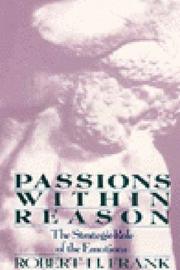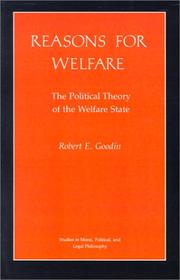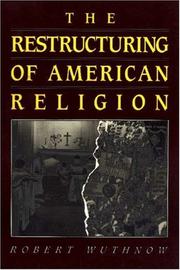| Listing 1 - 8 of 8 |
Sort by
|
Book
ISBN: 8811598036 Year: 1988 Publisher: Milano Garzanti
Abstract | Keywords | Export | Availability | Bookmark
 Loading...
Loading...Choose an application
- Reference Manager
- EndNote
- RefWorks (Direct export to RefWorks)
Altruism --- Ethics --- Social ethics
Book
Year: 1988 Publisher: Cambridge, Mass. National Bureau of Economic Research
Abstract | Keywords | Export | Availability | Bookmark
 Loading...
Loading...Choose an application
- Reference Manager
- EndNote
- RefWorks (Direct export to RefWorks)
This article demonstrates that Ricardian Equivalence does not necessarily hold in models with altruistic transfers once one takes into account the strategic behavior of recipients as well as donors. To influence the final allocation of consumption in altruistic settings, potential recipients can threaten to refuse as well as accept transfers. We apply the Extended Nash Bargaining Solution to the problem of an altruistic parent and a possibly altruistic child. The parent and child first choose a threat point noncooperatively; this threat point then influences the final allocation of consumption through the standard Nash Bargaining Solution, While the potential recipient can refuse transfers from the potential donor, he cannot refuse transfers from the government. When the government redistributes between the parent and child, it changes their endowments and the equilibrium threats, and thus the final allocation of consumption. The feature of the cooperative model presented here that leads to the failure of Ricardian Equivalence may be characteristic of a wider class of cooperative and noncooperative altruism models. This feature is that noninterior strategic postures underlie interior transfer behavior and that these non- interior strategic postures are altered by government redistribution.
Altruism --- Parent and child. --- Families --- Economic aspects --- Mathematical models. --- Economic aspects.
Book
ISBN: 9026509316 Year: 1988 Publisher: Lisse Swets en Zeitlinger
Abstract | Keywords | Export | Availability | Bookmark
 Loading...
Loading...Choose an application
- Reference Manager
- EndNote
- RefWorks (Direct export to RefWorks)
Sociology of organization --- Social policy --- Sociology of social welfare --- Helping behavior --- -Behavior, Helping --- Human behavior --- Interpersonal relations --- Altruism --- Caring --- Evaluation --- Evaluation. --- -Evaluation --- Behavior, Helping

ISBN: 0029238307 Year: 1988 Publisher: New York (N.Y.) Free Press
Abstract | Keywords | Export | Availability | Bookmark
 Loading...
Loading...Choose an application
- Reference Manager
- EndNote
- RefWorks (Direct export to RefWorks)
Altruism --- Motivation (Psychology) --- Righteous Gentiles in the Holocaust --- -World War, 1939-1945 --- -European War, 1939-1945 --- Second World War, 1939-1945 --- World War 2, 1939-1945 --- World War II, 1939-1945 --- World War Two, 1939-1945 --- WW II (World War, 1939-1945) --- WWII (World War, 1939-1945) --- History, Modern --- Righteous of the nations (Judaism) --- Holocaust, Jewish (1939-1945) --- World War, 1939-1945 --- Action, Psychology of --- Drive (Psychology) --- Psychology of action --- Psychology --- Altruistic behavior --- Unselfishness --- Conduct of life --- Charity --- Helping behavior --- Jews --- -Rescue --- Rescue --- -Psychology --- European War, 1939-1945 --- Jews&delete& --- Altruism. --- Rescue of Jews, 1939-1945 --- Rescue, 1939-1945
Book
ISBN: 0471917265 Year: 1988 Publisher: New York (N.Y.) Wiley
Abstract | Keywords | Export | Availability | Bookmark
 Loading...
Loading...Choose an application
- Reference Manager
- EndNote
- RefWorks (Direct export to RefWorks)
Helping behavior --- Interpersonal relations --- Professions --- Career patterns --- Careers --- Jobs --- Professional services --- Occupations --- Interprofessional relations --- Vocational guidance --- Behavior, Helping --- Human behavior --- Altruism --- Caring --- Problems, exercises, etc --- Study and teaching --- Psychological aspects&delete& --- Sociology of health --- Didactics of social education --- Didactics of medicine --- Psychological aspects

ISBN: 0393026043 0393960226 9780393960228 9780393026047 Year: 1988 Publisher: New York : Norton,
Abstract | Keywords | Export | Availability | Bookmark
 Loading...
Loading...Choose an application
- Reference Manager
- EndNote
- RefWorks (Direct export to RefWorks)
The "Me" generation has justified itself by appealing to social scientists who see selfishness as the only rational basis for action. But what are we to make of selfless acts in business, personal life, even politics? In this provocative book, Robert Frank shows us that looking out for Number One may require that we look out for others, too. He finds his evidence in our emotional acts. Like the blush on telling a lie, they can serve as hard-to-fake signals of a commitment to social values. We recognize these signs; we know people we trust; and if we can identify trustworthy fellows we can reject those who do not merit our faith.
Social ethics --- Affective and dynamic functions --- 174.5 --- Altruism --- Emotions --- Ethics --- Motivation (Psychology) --- Rationalism --- -Knowledge, Theory of --- Religion --- Belief and doubt --- Deism --- Free thought --- Realism --- Action, Psychology of --- Drive (Psychology) --- Psychology of action --- Psychology --- Deontology --- Ethics, Primitive --- Ethology --- Moral philosophy --- Morality --- Morals --- Philosophy, Moral --- Science, Moral --- Philosophy --- Values --- Feelings --- Human emotions --- Passions --- Affect (Psychology) --- Affective neuroscience --- Apathy --- Pathognomy --- Altruistic behavior --- Unselfishness --- Conduct of life --- Charity --- Helping behavior --- Economische ethiek. Speculatie --- Psychological aspects --- -Economische ethiek. Speculatie --- 174.5 Economische ethiek. Speculatie --- Altruisme --- Emoties --- Ethiek --- Ethique --- Gevoelens --- Motivatie (Psychologie) --- Motivation (Psychologie) --- Passies --- Sentiments --- Émotions --- Émotivité --- -Action, Psychology of --- Emotions. --- Altruism. --- Ethics. --- Éthique --- Morale --- Motivation (psychologie) --- Rationalisme --- Psychological aspects. --- Knowledge, Theory of --- Rationalism - Psychological aspects. --- Morale. --- Émotions. --- Altruisme. --- Rationalisme. --- Rationalism - Psychological aspects --- Émotions.

ISBN: 0691077665 Year: 1988 Publisher: Princeton, NJ : Princeton University Press
Abstract | Keywords | Export | Availability | Bookmark
 Loading...
Loading...Choose an application
- Reference Manager
- EndNote
- RefWorks (Direct export to RefWorks)
Robert Goodin passionately and cogently defends the welfare state from current attacks by the New Right. But he contends that the welfare state finds false friends in those on the Old Left who would justify it as a hesitant first step toward some larger, ideally just form of society. Reasons for Welfare, in contrast, offers a defense of the minimal welfare state substantially independent of any such broader commitments, and at the same time better able to withstand challenges from the New Right's moralistic political economy. This defense of the existence of the welfare state is discussed, flanked by criticism of Old Left and New Right arguments that is both acute and devastating. In the author's view, the welfare state is best justified as a device for protecting needy--and hence vulnerable--members of society against the risk of exploitation by those possessing discretionary control over resources that they require. Its task is to protect the interests of those not in a position to protect themselves. Communitarian or egalitarian ideals may lead us to move beyond the welfare state as thus conceived and justified. Moving beyond it, however, does not invalidate the arguments for constantly maintaining at least the minimal protections necessary for vulnerable members of society.
Welfare state. --- Social justice. --- Bryan, William Jennings. --- Catholic Benevolent Fund. --- Gross National Product (GNF). --- Harrington, Michael. --- Heclo, Hugh. --- Joseph, Sir Keith. --- Keynesianism. --- Laffer curve. --- absolute needs. --- activist welfare state. --- adverse selection. --- air pollution. --- apartheid policies. --- bias and impartiality. --- capital distribution. --- clientelism in welfare. --- closet altruism. --- collective conscience. --- commercialization and services. --- conditional needs. --- contingent freedom. --- culture of poverty. --- defense contracts. --- disability insurance. --- duty of care concept. --- earnings, and labor supply. --- economic justice. --- entailed estates. --- extra-market allocation. --- farm relief. --- flagrant violation concept. --- formal discretion. --- fraternal organizations. --- generosity. --- gift relationship: altruism. --- humanism, and dependency. --- intentional discrimination. --- involuntary needs. --- laissez-faire. --- loss from exploitation. --- macroeconomics. --- mainstreaming. --- neighborhood schools. --- no choice standard. --- objective needs. --- obligations-based welfare. --- parenta. --- parole boards. --- personal deserts. --- positive discrimination. --- quality control. --- residential patterns.

ISBN: 0691020574 0691073287 0691224218 9780691073286 9780691020570 Year: 1988 Publisher: Princeton, New Jersey : Princeton University Press,
Abstract | Keywords | Export | Availability | Bookmark
 Loading...
Loading...Choose an application
- Reference Manager
- EndNote
- RefWorks (Direct export to RefWorks)
The description for this book, The Restructuring of American Religion: Society and Faith since World War II, will be forthcoming.
2 <73> --- #SBIB:316.331H580 --- #KVHA:Godsdienst; Verenigde Staten --- #KVHA:American Studies --- Godsdienst. Theologie--Verenigde Staten van Amerika. VSA. USA --- Godsdienstige verandering: algemeen --- 2 <73> Godsdienst. Theologie--Verenigde Staten van Amerika. VSA. USA --- United States --- Religion --- Religion. --- Religion, Primitive --- Atheism --- Irreligion --- Religions --- Theology --- American Bible Society. --- Assemblies of God. --- Buddhists. --- Campus Crusade for Christ. --- Christian Scientists. --- Church of Christ. --- Dallas Theological Seminary. --- Disciples of Christ: formation of. --- Fuller Theological Seminary. --- Great Revival. --- Jehovah's Witnesses. --- Jews: and immigration. --- Moody Bible Institute. --- Mormons. --- National Association of Evangelicals. --- National Council of Churches. --- Nazarene church. --- Oxford Movement. --- Pentecostalism. --- Republican party, and religious divisions. --- Salvation Army. --- Scopes trial. --- Second Vatican Council. --- Spiritualism. --- World Council of Churches. --- Youth for Christ. --- abolition movement. --- black churches. --- evangelicals: and religious television. --- frontier religion. --- independent churches. --- individualism: and altruism. --- laity, leadership of in frontier churches. --- millennialism, and postwar theology. --- optimism, in religion after World War II. --- philanthropy. --- religion: adaptive capacity. --- religious belief: during 1960s. --- religious rallies. --- sectarianism. --- symbolic boundaries. --- temperance movement.
| Listing 1 - 8 of 8 |
Sort by
|

 Search
Search Feedback
Feedback About UniCat
About UniCat  Help
Help News
News